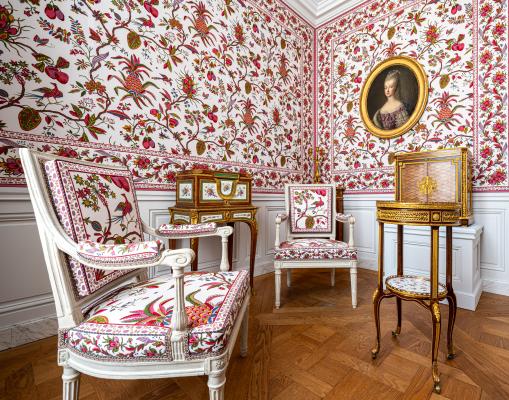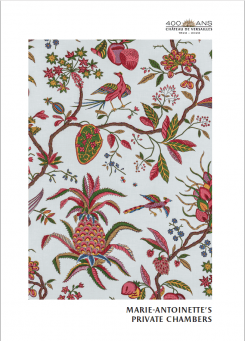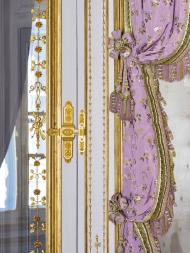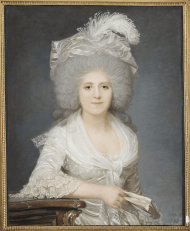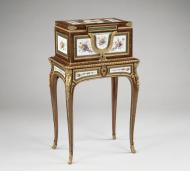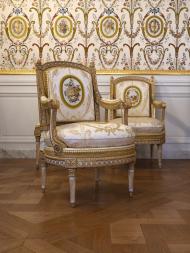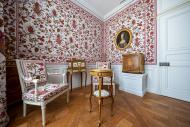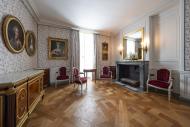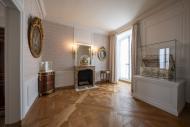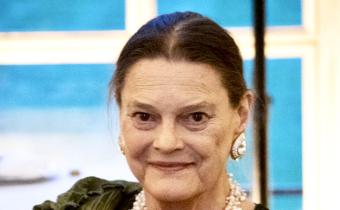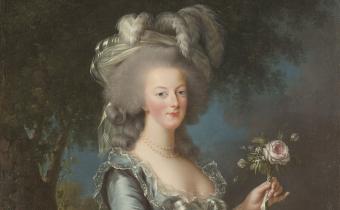Niched behind the gilded panelling and the silk wall hangings of the Queen’s State Apartment there lies a two-storey suite of smaller rooms with windows looking out upon modest inner courtyards. Welcome to the queen’s private chambers, decorated by Marie- Antoinette starting in 1774.
Méridienne room, library and gold room
The lower floor of these personal quarters comprises two rooms reserved for the sovereign. A chamber known as the “Méridienne” – in reference to the divan positioned in a mirror-clad alcove – was fitted out for Marie-Antoinette in 1781. The décor of this room, among the most precious in the Palace, evokes the joy of the royal couple upon the birth of their first son. Extensive research by curators made it possible to reproduce the final lilac-hued textile decoration, enriched with varied tones of green that adorned the room under Marie-Antoinette.
The adjacent library, which has recently been restored as well, exhibits a superbly delicate décor also dating from 1781: two-toned gilding, doors concealed by mock book jackets and ingenious shelves supported by a rack and pinion system exemplify the uniqueness of this room. The Méridienne Room and Library were restored thanks to the patronage of the Friends of Versailles.
Next comes the great inner chamber or “Gold Room”. In 1779, Marie-Antoinette had the walls covered with monumentally rich silk hangings embellished with flowers, arabesques and gold medallions, supplanted in 1784 by a new decor of sculpted wood panelling inspired by the budding fascination with ancient Egypt. Known as the “Gold Room” in reference to this décor, the chamber recently underwent a comprehensive restoration.
an air of liberty on the upper floor
As of 1774, the queen laid out a series of smaller rooms directly above. These spaces were reserved for her personal use, as well as for her Principal Chambermaids and servants. The two storeys were connected by narrow staircases, including the Billiard Staircase, located behind the alcove in the Queen’s Bedchamber. Following extensive archival research into the use and hierarchy of these rooms, as well as the appearance and production of the original Toile de Jouy fabrics during the reign of Marie-Antoinette, these rooms will all be restored, refurnished and embellished with new fabric adornments.
Visitors will be invited to discover a new layout evoking the private life of Marie-Antoinette. The spaces include two rooms “À la Reine” – a dining room and a boudoir – a Billiard Room (an immensely popular game at Court since the time of Louis XIV) transformed into a Reception Room, three rooms reserved for the Principal Chambermaids and three servants’ rooms. Initiatives to reproduce the Toile de Jouy fabrics, a central feature of the refurbishment of the upper floor, served to promote preservation of artistic crafts by making extensive use of the traditional flatbed technique, thanks to the expertise and patronage of the Maison Pierre Frey. As such, the rooms “À la Reine” will exhibit decorative features such as Great Pineapple fabric, one of the finest creations of the Manufacture de Jouy in the 18th century.
These chambers will be refurnished with new acquisitions and a collection of restored and reupholstered furniture and objets d’art. Each space will evoke a facet of the queen’s life: Madame Campan, her Principal Chambermaid, her entourage, in particular the Princesses of Chimay and Lamballe, the royal family and the close relationships she maintained with her children. One room will exhibit specimens of 18th century textiles used for these chambers, while a final space will be dedicated to the memory of Marie- Antoinette.
Marie-Antoinette: a queen with a need for privacy
Shortly after her arrival in Versailles in 1770, Marie-Antoinette took as her own the first-floor apartment of Marie Leszczynska, as well as several private rooms located on the other side. A bold young lady with unabashed tastes and keen appreciation of her rank as Archduchess of Austria and future Queen of France, she quickly ordered work to beautify her quarters. Her demanding and impatient nature even sparked disapproval from Ange Jacques Gabriel, First Architect to the King.
These successive refurbishments became more and more frequent, testifying to the desire for privacy felt by a vivacious young woman with an innate taste for independence. In these chambers, the queen’s true living quarters accessible only to the chosen few, Marie- Antoinette enjoyed respite from the trials and tribulations of court life and spent time with her children and her intimate circle of friends.
She never ceased to transform, extend, refurbish and beautify her chambers until 1788, indulging her passion for interior design. She arrayed these rooms with especially elegant furnishings, illustrations of the harmony and perfection of the French decorative arts at the twilight of the Ancien Régime.
Practical Information
Limited-Time Events
from 27 June to 9 July
For two weeks, the Palace of Versailles offers its visitors 12 guided visits per day to discover the restored and refurbished queen’s private chambers.
Information and booking: chateauversailles.fr

